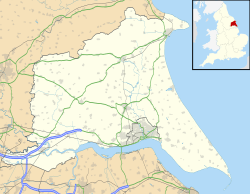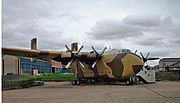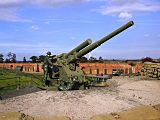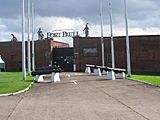Fort Paull facts for kids
Quick facts for kids Fort Paull |
|
|---|---|
| Paull Cliff Battery Point Cliff Battery |
|
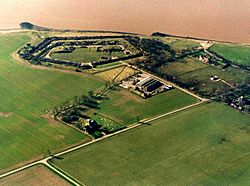
Aerial view
|
|
|
Location within the East Riding
|
|
| Coordinates | 53°42′48″N 0°13′46″W / 53.713360°N 0.229450°W |
| Type | Napoleonic War |
| Site history | |
| Built | 1861–1864 |
| In use | 1864–1960 |
| Garrison information | |
| Occupants | Fort Paull, Museum, Armouries and Visitors Centre |
Fort Paull is an old gun fort located on the north side of the Humber river. It is near the village of Paull, a short distance from Hull in northern England. This historic site has protected the area for many years.
Contents
Fort Paull's Story
Early Defenses
People have built defenses at Paull for a very long time. King Henry VIII started the first fort here in 1542. It was designed to hold 12 guns. Later, King Charles I also used defenses at Paull during the English Civil War. This was when Hull was under attack. Defenses were also important during the Napoleonic Wars.
Building the Modern Fort
The fort you see today was built between 1861 and 1864. It has a unique five-sided shape. This fort was part of a group called the Palmerston Forts. These forts were built to protect Britain's coast. They were recommended by a special group called the Royal Commission.
Guns and Changes
When the fort was first built, it had nineteen large 64-pounder guns. These were called RML artillery pieces. In 1894, these guns were hidden or removed. New concrete areas were built for different, more modern guns. These included three 6-inch BL guns and two 4.7-inch QF guns. A special station for laying underwater mines was added in 1886. Searchlights were also installed in 1907. After 1902, the three 6-inch gun positions were updated with newer types of guns.
Wartime Roles
At the start of the First World War, Fort Paull was thought to be too close to Hull. So, its guns were removed. New forts were built further away to protect the area better. Between the two World Wars, the fort became a training base for soldiers. During the Second World War, it was used as a storage place for ammunition. This ammunition was for ships going on important convoys to Russia. A special station to protect ships from magnetic mines was also added.
From Fort to Museum
Opening as a Museum
In 1960, the Ministry of Defence no longer needed Fort Paull. It was closed down. But in 1964, a group of volunteers called the Friends of Fort Paull took over. They worked hard to restore the fort. Their goal was to turn it into a museum. Fort Paull finally opened to the public as a heritage museum in 2000.
A Special Aircraft and Closure
The museum had many interesting exhibits. It featured a waxwork museum with figures from the fort's long history. There was also an armoury with different types of guns and armored vehicles. The fort often hosted military re-enactment events. Fort Paull was also home to the very last complete Blackburn Beverley heavy transport aircraft. In January 2020, it was announced that the museum would not open for that year. The museum's items were sold at an auction on September 19, 2020. The Blackburn Beverley aircraft sold for £21,000.
A New Beginning
Reopening for Visitors
In May 2024, good news was shared on social media. A new owner had bought the site. They planned to work on the fort to reopen it. The new owners wanted to bring the site back to life for future generations. They also hoped to start running events there again. Since many museum items were sold, they had to start fresh. The attraction officially reopened on September 28, 2024, with a classic car weekend.
Gallery


